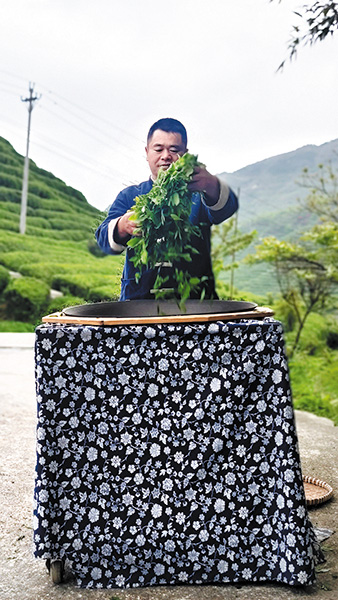

"I was both nervous and excited," he says, adding that this childhood tea roasting experience has made him proud and planted the seeds of desire for him to make a career out of it.
When he was young, tea made by Zhang's family sold at high prices. Such recognition reinforced Zhang's confidence in making the tea.
In the 1980s, many of his fellow villagers went outside to seek jobs with better incomes than what could be obtained in a rural setting, but Zhang stayed, contracting a 1.3-hectare plot of land where he applied his family tea growing skills.
The first year saw him make a profit of more than 1,500 yuan ($216.3), which was a lot of money at the time.
This outstanding performance soon brought attention to him, including from the head of the local tea processing plant.
He was soon recommended to be director at the processing plant, where he worked for the following 16 years.
"My biggest dream during the years at the tea plant was to have my own tea garden," Zhang recalls.
He acted on the dream in 2008 when Duyun came up with policies to develop the tea industry and encourage tea farmers to expand planting.
When Zhang heard the news, he was overjoyed and discussed with his wife his dream of building his own tea garden.
He then leased 25.3-hectare plot of barren land in Pingyang village and started planting tea. In 2009, Zhang joined forces with 38 rural households to establish the Shili Tea Fragrance Cooperative, which contracted more than 45 hectares of tea land.
A tea processing plant was established, and ever since, Zhang and his team have been highly successful in the tea business.
In 2018, the cooperative achieved a production value of more than 4 million yuan.
Local authorities have also vigorously developed tourism based on tea culture, which has brought Zhang's craft more public attention.
Liu Qian, a visitor from downtown Duyun, got a good measure of the tea's charm at a tea festival during the May Day holiday.
"It was my first time experiencing the production of Duyun Maojian tea, and I found it very interesting," Liu says. "At the same time, I also see the difficulty of making it, and I will better appreciate it when I drink it."
According to Zhang, tea roasting looks simple, but to do the right thing at the right time is not easy.
"The key to successfully frying Duyun Maojian tea lies in precise control of the pot temperature," he explains.
Although Zhang has stuck to the traditions of his craft for decades, he has also innovated based on his experience.
For example, in the past, locals could only pick Duyun Maojian tea for a month every year starting from the Qingming Festival around April. The short-term income was far from enough, forcing many villagers to work away from home.
After seeing the problem, Zhang bought books to study fermentation and experimented over subsequent years, developing his signature "Golden Maojian" black tea with its unique aroma, rich taste and long shelf life.
The new tea has enjoyed brisk sales and greatly increased the utilization of local tea resources, bringing more income to local tea enterprises and farmers.
As Zhang's first dream of owning his own tea plantation has been realized, he has set his sights on a new dream — to have more people learn about tea roasting and share his love of it.
Since 2017, he has worked with the Qiannan Polytechnic for Nationalities, inviting students from the institute to come every spring to the tea mountain to do fieldwork, including picking and roasting tea leaves.
Zhang has made a point of demonstrating the key steps for the students. "I am willing to teach as long as they are willing to learn," Zhang says.
He says he hopes that more students can combine textbook knowledge with practical experience, inheriting the ability to make Duyun Maojian tea.
"This way, more people can taste happiness," he says.